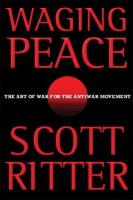Scott Ritter is a former Marine who worked on the planning for what would become Operation Desert Storm and later as a United Nations weapons inspector in Iraq. His skepticism about the Dubya Squad’s claims of Saddam’s weapons-of-mass-destruction arsenal and his opposition to the Iraq War whiplashed him from being a Fox News expert commentator to a big name on the anti-war lecture circuit.
In , he wrote a tough-love criticism of the American anti-war movement that I approvingly linked to. It read, in part:
It is high time for the anti-war movement to take a collective look in the mirror, and be honest about what they see. A poorly organized, chaotic, and indeed often anarchic conglomeration of egos, pet projects and idealism that barely constitutes a “movement,” let alone a winning cause.… The anti-war movement lacks any notion of strategic thinking, operational planning, or sense of sound tactics.… The anti-war movement needs to study the philosophies of those who have mastered the art of conflict, from Caesar to Napoleon, from Sun Tzu to Clausewitz.
He now has a book out, Waging Peace: The Art of War for the Antiwar Movement, that expands on this criticism and on his program for improvement.
The book, unfortunately, doesn’t add much to his original argument that needs hearing. It’s slim: fewer than 200 pages, and fully half of those pages are filler:
- 63 pages are devoted to reprinting the complete text of the U.S. Constitution (including the full list of signatories) and of the U.N. Charter — as though nobody knew how to look those up on-line
- 7 pages reprint the article I linked to above
- 10 pages are blank
- 20 pages are title / copyright / table-of-contents / index / throat-clearing
- That leaves fewer than 100 pages of meat, even if you include the two diagrams and the sometimes lengthy quotes from other sources
It’s really a magazine article-sized argument that’s been puffed up to fit in a book.
And the argument, though it has moments of insight, for the most part seems silly and unrealistic. Ritter imagines the U.S. anti-war / progressive / peace & justice movements becoming effective by uniting under a national organization (perhaps, he suggests, the “National Concerned Citizens Activism Association”) that defines its operational terminology, organizes and trains much in the manner of FEMA, makes the defense of the U.S. Constitution its core value, and organizes in a hierarchy in which people obtain ranks such as Activist Ⅰ, Activist Ⅱ, and so forth according to their training and skills so that they can be assigned and deployed as their leaders see fit.
I somehow can’t see that happening. Furthermore, Ritter’s love for the Constitution strikes me as bizarre. He sees making the Constitution the anti-war movement’s core value as a way for the movement to reconnect with regular Joe America (he asks the reader to imagine how a message will play with, say, someone on your neighborhood volunteer fire department):
The Constitution, like the soul of America, lies discarded and trampled by those who would seek to hijack the promise of America for their own self-serving purposes… If progressives are truly interested in waging peace, and fighting to win then they will pick up the banner of the Constitution and claim it as their own, and make their rallying cry, one that is derived from the very essence of that which defines this great nation.… [This] would be extremely attractive to mainstream America, the battle for whose support the ideological struggle for the future of America hinges on.
But in the paragraph before this, Ritter laments that most Americans know nothing about the Constitution, and hardly any have “read, comprehended, and absorbed into one’s daily life the ideals and values set forth” therein. These ideals and values, Ritter says, “define who we are and what we are” and so “[i]f you haven’t read the Constitution (and it appears that most Americans have not), then you’re not a functioning American.”
How is the anti-war movement supposed to make any ground with middle America by appealing to them about a document they only know of by legend? And what is going to keep the pro-war establishment from appealing to it just as effectively? Like that other great literary rallying point, the Bible, it doesn’t seem to matter too much what’s actually written down in it — there’s sure to be a plausible interpretation that suits any propaganda needs. Indeed, don’t all of the politicians who gave us the Iraq war and all of the troops who carried it out swear to defend the Constitution as their core value?
Considering how rhapsodically Ritter waxes over the Constitution, I have to wonder whether he’s read it. In truth, it’s not a very inspiring document. It’s a boring org chart in paragraphs for the most part. You have to have a lot of imagination to be inspired by it or to think that it could “define who we are and what we are.”
The anti-war movement could certainly stand to take itself and its goals more seriously. Scott Ritter’s insights in this regard, if condensed and collected onto both sides of a single sheet of paper, would still be legible and valuable.

